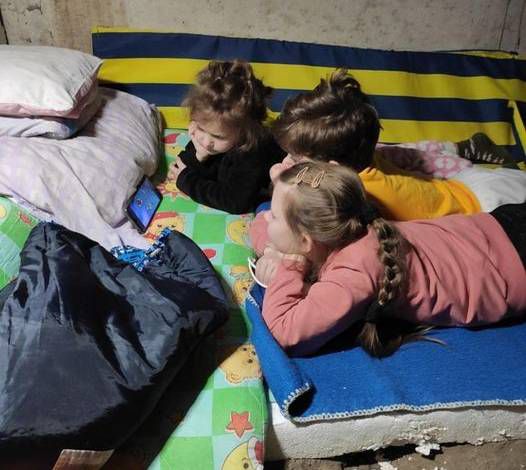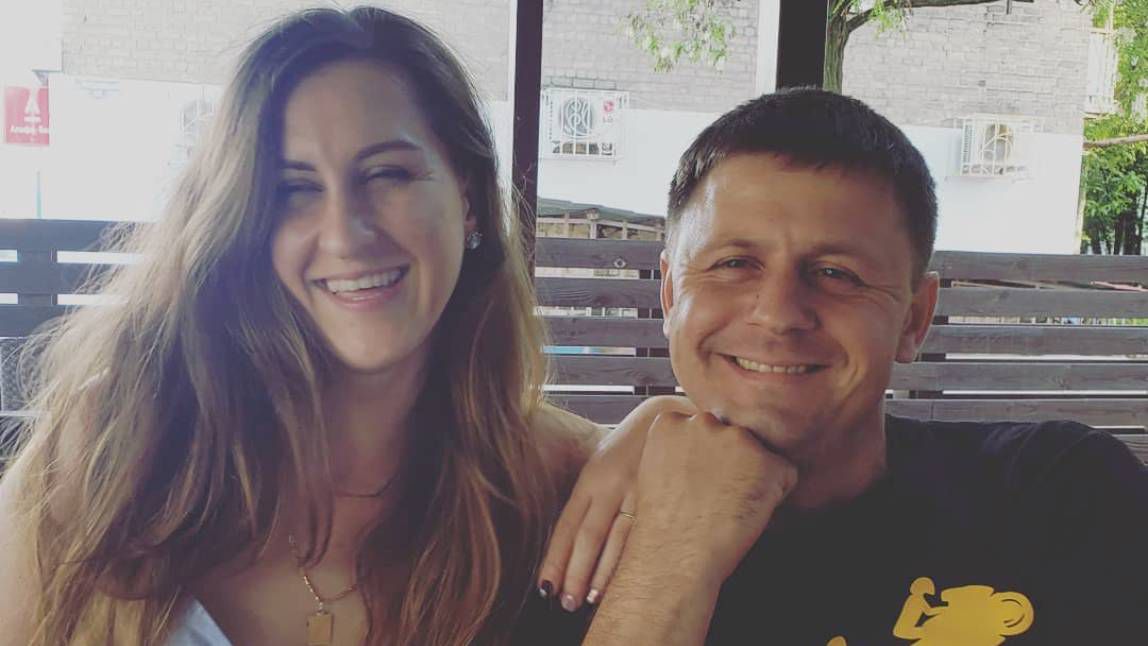This is the third part in a series of interviews with Ukrainians who call Hawaii home. Read about nuclear weapons in the first part, Putin’s use of fake news in the second part and supporting Ukraine from Hawaii in the fourth part.
HONOLULU — Four Ukrainians who live in Hawaii spoke to Spectrum News Hawaii about what it has been like watching Russia launch a military attack in their home country. Since the war started on Feb. 24, they all said they have felt a range of emotions from disbelief, shock, extreme sadness, stress, fear, guilt about being away from their home country, and pride for the way Ukrainians and the country's President Volodymyr Zelenskyy have stood up to the Russian invasion.
While for many in Hawaii, Ukraine feels like it’s on the other side of the world — it is a 12-hour time difference — Jairus Grove, a political science professor at the University of Hawaii at Manoa said it is important to acknowledge that Hawaii does have a Ukrainian community.
He said that people in Hawaii who aren’t from Ukraine also care about what’s happening, whether they are an anti-war activist or a member of the U.S. military. Additionally, he encouraged those who might feel Ukraine is far away to take the time to engage, as everyone's participation is important for a flourishing democracy.
According to Grove, the United States, which includes people in Hawaii, will have to discuss where the priorities of the country are. President Joe Biden has been focusing his attention on China, but now with a war happening in Europe on the boundary of NATO allies, the U.S.’s priorities might shift, said Grove.
He also said the United States is “part of this process, whether or not we like it,” because after the Cold War, Ukraine gave up its nuclear weapons in exchange for a promise that their territorial integrity would be protected.
“There are other states that would like to challenge the territorial integrity of neighbors,” said Grove. “We know that China would like to reincorporate Taiwan.”
He said countries like China want to know how far they can push before getting a response from the U.S.
“Given we're going to be … invested in what's happening in Europe, my guess is that we are also going to be conservative about how we respond and when we respond, and that'll have real repercussions for the Pacific,” said Grove.
Missing family in Ukraine
Oksana Enriquez Klyuchnichenko, who is from Kostyantynivka in Donbas, Ukraine, came to Hawaii in 2003 at age 15 as a high school exchange student under a scholarship program with the U.S. Department of State and attended Nānākuli High & Intermediate School.
During her year-long stay in Hawaii, she lived with a Hawaiian family before returning to Ukraine. With the help of her host family, she returned to Oahu to attend college at Hawaii Pacific University.
“They really wanted a good education for me as they are my ohana — they're my hanai family,” said Klyuchnichenko in an interview with Spectrum News Hawaii. “I went to university, and I started a life here.”
Now, Klyuchnichenko, 33, works as a project executive for a translation company. She has citizenship in the U.S. and Ukraine.
Every year, for two months, Klyuchnichenko visits Ukraine to spend time with her family and friends.
“I'm mostly familiar with Hawaiian culture and Hawaii is my second home and … a place that I love with all my heart, but my other home, my universe … my soul is Ukraine,” said Klyuchnichenko.
She said her mother, father and brother still live in Kostyantynivka. Her brother, who is 41 years old, recently joined the fight against the Russian military.
“He wants to fight for his family,” said Klyuchnichenko about her brother, who has a 14-year-old son and 9-year-old daughter. She said he is also fighting for freedom, culture, economic opportunities, and to live in an independent sovereign state with freedom of speech and human rights. Klyuchnichenko said when her brother was younger he was in the military service as a sniper, but there weren’t any conflicts at the time.
“I talked to my mom yesterday, and when I called her, she was crying,” said Klyuchnichenko. “It's hard to say anything to people that you may not see again. All you can do is just try to keep it together, and fight any way you can on this end.”
Like her brother, Klyuchnichenko said if she was in Ukraine she would join the fight too, but since she is far away, she is raising money to donate basic supplies — food, medication, socks, underwear, warm clothes (since it has been snowing in Ukraine) — to send to people in need, including cancer patients.
She encouraged people who are interested in helping Ukraine to follow her on Instagram for more information and to learn about fundraisers she is starting to help raise money for Kostyantynivka.
Shocked and worried
Klyuchnichenko said after she first heard that Russia had attacked Ukraine, she got in a car accident at an intersection in Manoa, where she was T-boned, and her car was totaled.
“I was very nervous that day, and I was helping a friend and then I was just thinking about war. ‘What if there's war? What if something really does happen?’” said Klyuchnichenko. “I was driving and I got into an accident. My car's totaled, but I'm okay. I think I was just not okay mentally.”
She said she was in shock and cried for three hours after the accident.
“I was very just sad and devastated,” said Klyuchnichenko.
Still, she couldn’t believe that the war had started, so she called her best friend, Anastasia, and in the background she could hear bombs.
With her voice shaking, Klyuchnichenko talked about Anastasia and her two children, who are five- and six years old, and have been hiding in a bomb shelter in Kharkiv since Feb. 24. She said they talk every two hours, but she had lost contact with them the day before.

“I don't sleep. I slept four hours today, and this is the most I (have) slept since the 24th,” said Klyuchnichenko.
She said another friend who is in Kyiv, the capital of Ukraine, which has been heavily attacked since the Russian invasion started two weeks ago and many civilians have joined the fight to defend the city. Her friend has her six-year-old daughter sleep in a bathtub, because it is supposed to be safer if the walls of a building crumble after being hit.
Each time she talks with her friends, she says, “I love you. If anything, just know that I love you.”
“I know addresses for all of my people, because if their building get(s) bombed, I need to look it up,” said Klyuchnichenko. “I haven't put my phone down.”
Comparing Putin to Hitler
Klyuchnichenko said she fears Russia will use nuclear weapons and believes it’s a reason that other countries have not helped Ukraine in the fight against Russia. She also said Putin shares many similarities with Hitler.
“If you know of Hitler's youth and Hitler's propaganda, if you’ve seen how Nazism came to be, it's exactly 100% parallel to what Putin is doing and has been doing for the past 20 years, brainwashing his own people,” said Klyuchnichenko.
“The words (Putin) uses when he talks in his speech are very, very Hitler-like, very similar. And when there was World War II, the whole world said never again. After the bombing of Pearl Harbor, after the Hiroshima, Nagasaki, after the events of Holocaust, and insane events in Europe, we really have it again on smaller scale, but this is just the beginning. Hitler didn't come and attack in 1939, he … started attacking his people in 1933,” said Klyuchnichenko.
Grove, the university professor, said comparing Putin to Hitler isn’t apt, because Putin is an astute and credible military thinker — and in some ways that makes him more of a threat.
“Hitler did not have the kind of military profile that Putin does right. Putin was a rising star in the KGB. He has knowledge of hybrid warfare, torture, espionage, strategic communication, propaganda, disinformation campaigns and military capabilities after serving the role that he's been in,” said Grove. “Hitler was militarily a fool.”
He added that Hitler didn’t have nuclear weapons and said that Russia is positioned better geographically, as Germany was attacked on both sides by Russia and the Allies.
“In some ways, I think that the comparison to Hitler, unfortunately, deflates just how serious it is to have someone like Putin who's willing to do this level of violence and make this level of threat in the position he is in,” said Grove.
However, Klyuchnichenko certainly knows that Putin is a reason to be worried.
“This is just someone trying to completely destroy the nation and the people of my country,” said Klyuchnichenko about Putin.
CORRECTION: A previous version of this story misstated the university that Klyuchnichenko attended. She is a graduate of Hawaii Pacific Univeristy. (March 14, 2022)



